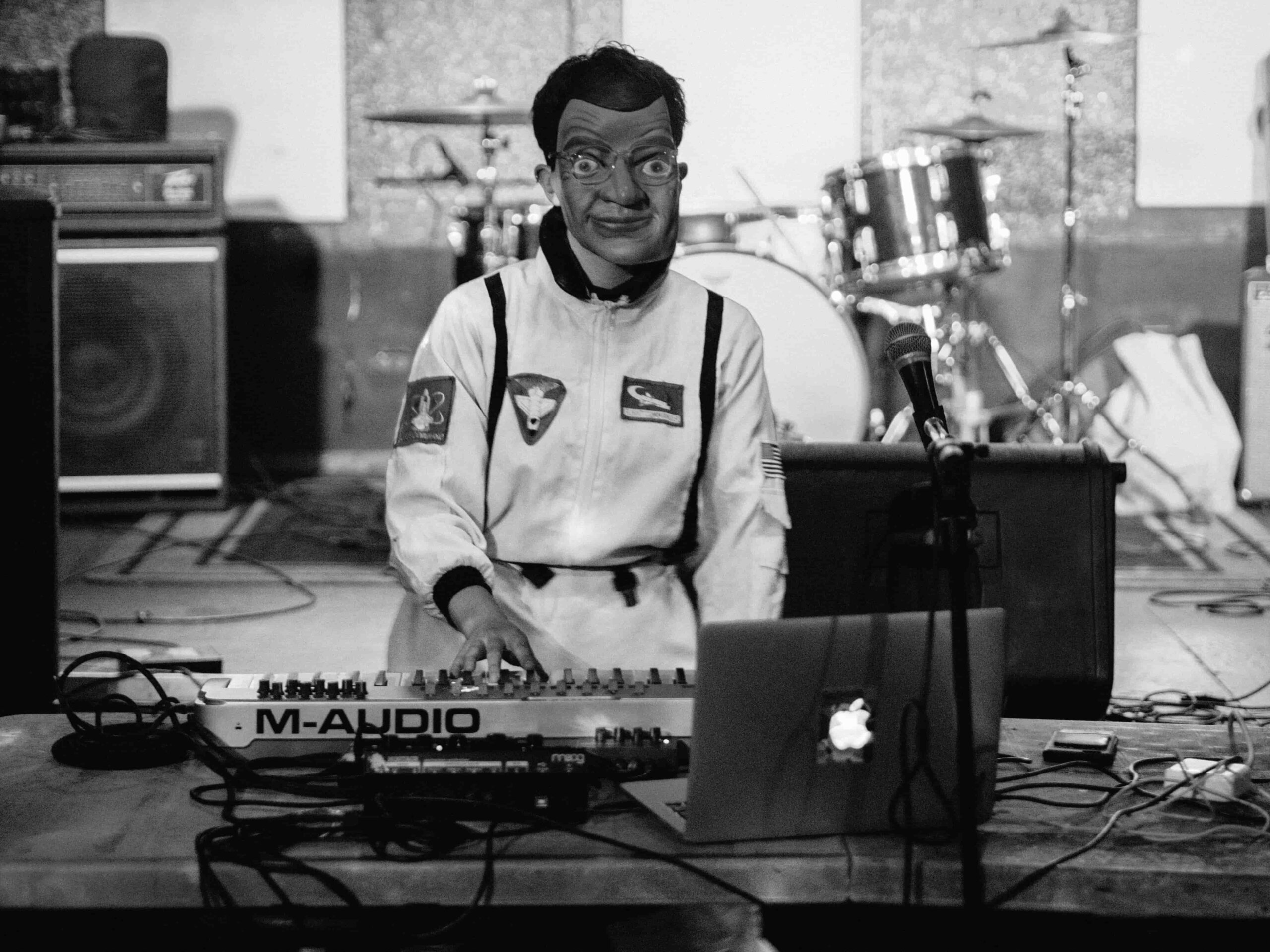Shitlord Fuckerman is an act of self-care. Since their live debut in 2015, the alter ego of Vancouver musician and animator Gil Goletski has been used as an outlet for artistic expression and as a tool to overcome social anxiety. In their playfully confrontational performances, Shitlord Fuckerman hits the stage like a one-person DEVO, crawling through the crowd in a rubber mask and astronaut jumpsuit while high-energy beats whip them into a frenzy. In Goletski’s words, “going apeshit” helps them stay in control.
“I don’t really know why I perform,” Goletski says with a laugh over Zoom. “It’s both cathartic and completely anxiety-inducing, but the mask definitely saves me from the fake humiliation I’m experiencing in my head. It’s hard for me to interact with people, but I also have a need for it, so I find weird life hacks. The best way is to make it part of the bit.”
While Shitlord Fuckerman has gained wider recognition in recent years, the project dates back to Goletski’s experiences in high school in the early 2010s. Growing up in the small town of Comox, B.C., on Vancouver Island, the earliest highlight of their time in music was when Goletski’s teenage band American Supine had the opportunity to open for punk legends NoMeansNo. (NoMeansNo was a Victoria-based trio formed in 1979 who earned cult fame for their complex instrumentation, subversive humour and defiance of genres, providing a perfect template for the kinds of art Goletski would go on to create.)
“American Supine was a punk band, but not a very punk one,” Goletski chuckles. “As a drummer, I was really into prog bullshit, while my other bandmates were into the Dead Kennedys and Neil Young. We were just asshole 17-year-olds butting heads constantly. Our name was some kind of teen cringe thing. I’m not old enough to find it quaint yet.”
At the same time as they were forming their first band, Goletski discovered chiptune—a style of electronic music using sounds found in vintage arcade games, computers and video game consoles. Their inaugural release as Shitlord Fuckerman was a 45-second song using an 8-bit sine wave plug-in for GarageBand. But while the advent of social media platforms provided a new avenue for creativity, Goletski took pleasure in remaining anonymous.
“I kept releasing music over the years fairly frequently because it was a hobby and no one was listening,” they say. “Most of the projects I do are just a compulsive thing. It was never something I intended to do publicly because I wasn’t playing the music, just composing it with little electronic blocks. Some of it would be impossible to play with my human hands.”
“I kept releasing music over the years fairly frequently because it was a hobby and no one was listening.”
Flash ahead several years, and Goletski’s roommate began organizing an event at the now sadly defunct Vancouver DIY venue Horses Records. When they settled on a bill filled with solo performances, they asked if Shitlord Fuckerman would be willing to make an IRL appearance. Goletski reluctantly agreed and spent a month preparing for the project’s grand unveiling. Shitlord Fuckerman’s unpredictable performances made an immediate splash on the local scene, as Goletski continued to revel in the confusion they had created.
“When people started playing my music on the radio and referring to Shitlord Fuckerman, the ambiguity of what gender I was—or if I was a band with multiple people—became funny to me,” they say. “That mirrors my personal transition in a way, but it’s mainly just a weird thing I thought would be both amusing, and give me a level of self-preservation while performing.”
Since debuting as a live artist, Shitlord Fuckerman’s musical releases have become increasingly absurd. The boldly titled 2019 album, Music Is Over!, references a queer electronic hero in the song “Patrick Cowley (In Agony),” as Mr. Oizo inspired beats propel a looping sample from ’70s anime film Lupin the Third: “My reputation for misogyny is legendary!” Elsewhere, Shitlord Fuckerman has penned a modern Christmas classic with “I Caught Santa Listening to Papa Roach,” explored ambient music on the brain donor EP and even mashed up the Vengaboys with Rage Against the Machine.
In their second life as a cartoonist and animator, Goletski slips off the mask and becomes far more vulnerable. The autobiographical 2020 comic, I Like Men, is a moving look at their formative experiences with autism, queerness and gender expression. Tomcats of Finland is less personal but still showcases their love of the male form, albeit it from a surrealist perspective. In their latest series, Cumbo, the pint-size TV detective played by Peter Falk encounters public gay sex with characters that look strikingly similar to their creator.
“I like Columbo because he’s a very positive portrayal of masculinity,” Goletski says. “At the same time, any kind of renaissance is hilarious to me because the show is so terminally ’70s. If somebody rebooted Columbo, that would be criminally fucked up. Over the past year, I’ve probably watched the original run of episodes five times. Look what he’s done to me!”
Goletski is also a founding member of the Flavourcel Collective, a group of animators working together to create opportunities for themselves in an industry without protection. “All of us were sick of the narrative of animators going into the industry and losing their drive to be creative because they follow the traditional pipeline,” they explain. “If you get a job on a big show like Rick and Morty, you’ll probably just work on animating their feet moving or something like that. It’s really skilled labour, but those kinds of studios are rife with violations and there are no unions in Canada.”
Since graduating from the Emily Carr University of Art and Design, Goletski and their fellow Flavourcel members have created a new form of collaboration inspired by the artist game Exquisite Corpse. “When we make music videos, one person will have five to 10 seconds to animate whatever they want, or each person will have total creative control over a specific element like the background. It’s collaborative but not in the sense that we have specific roles or a hierarchy. Everyone just has different skills that they bring to the group.”
Goletski’s latest animated project was completed entirely on their lonesome. The experimental piece Togawa en Regalia is named after Japanese musician Jun Togawa, with a subtle nod to Frank Zappa. Composing the song’s electronic sounds and creating its accompanying animation simultaneously, Goletski transformed everyday sights from their Vancouver neighbourhood into a hallucinogenic trip with the use of old school bitmap effects. Fire hydrants and foliage have rarely looked this sinister as they swirl through a mysterious monochrome world with buff tomcats on the prowl.
“I like it because it’s literally a one-bit image with only one colour—black on white,” Goletski says, laughing, highlighting a contrast between their elaborate musical performances and low-tech visual art. “When I play live, there are a lot of different little things plugged into other things, and if one thing comes loose the music stops completely. I’m the only person in charge of that, so I get panicky if I don’t have anyone else onstage with me to keep the show going. Whenever I have too much control I can’t handle it, so I try my best to keep things simple.”


 Why you can trust Xtra
Why you can trust Xtra


